9F2 Science
Section outline
-
-
Student ability to explain how living things are suited to their particular habitat and investigate the interdependence of living things in an ecosystem.
-
-
Week 1: One lesson this week!
- Welcome back to 2020. My name is Mrs Williamson and I will be your science teacher for part of the first term.
- I can be contacted on lwilliamson@mhjc.school.nz if you need to email me at any time. We have an exciting term planned and I look forward to getting to know you all.
Context this term is: Equity and Equality around the World
- In science, to link in with the context, we will be learning about chemistry.
- February 11th (next week) is International Women's Day in Science.
- Did you know that men continue to dominate in the STEM workforce (jobs involving science, technology, engineering and math? Why do you think this is?
- In our science classroom, you will notice we have a wall of successful women in these fields. How many of them have you heard of?

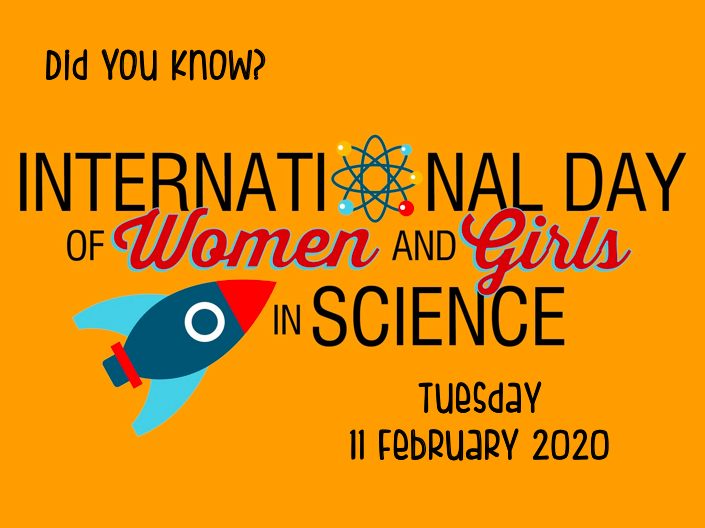
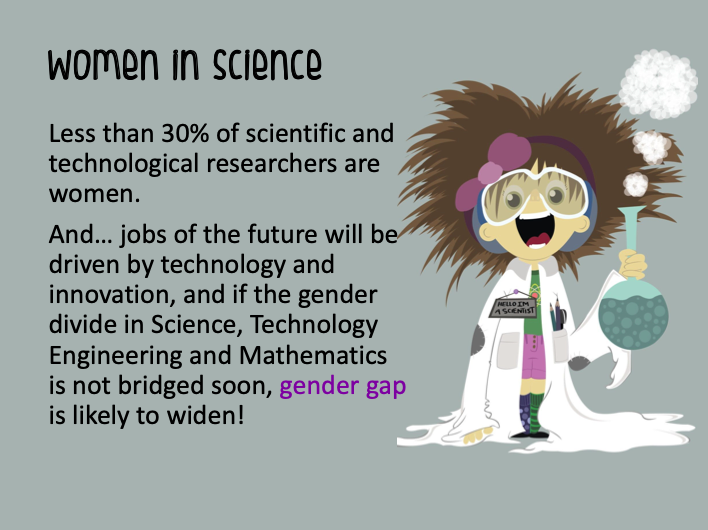

-
Week 2:
Learning intentions: This week we will spend a lesson or two getting to know each other and learn about Science Lab Safety.
Why is it important for both students and adults to follow lab safety rules?
Success criteria:
- I understand the lab safety rules and the importance of them. I have written these rules down, read them and signed my agreement with my Science Teacher.
- I know where the safety bucket is (for breakages and spillages) and can locate the fire extinguisher.
-
Week 3: This week in science we started chemistry with a practical investigation.
Learning intentions: See below
Success criteria: See below.
Key words: See below on the slide
Activities:
- Practical investigation: Chemistry Magic - Silver Eggshell.
- Developed an understanding what is required from us completing an experiment.
- Learnt how to draw experimental equipment.
- Practised writing up our experimental observation.
- Developed an understanding atoms - what they are? the word divisible, the subatomic particles, charges, electromagnetic force,
electron clouds, structure, mass of atoms, relative size of an atom - Watched Youtube video - size of atom in comparison to some common everyday objects.
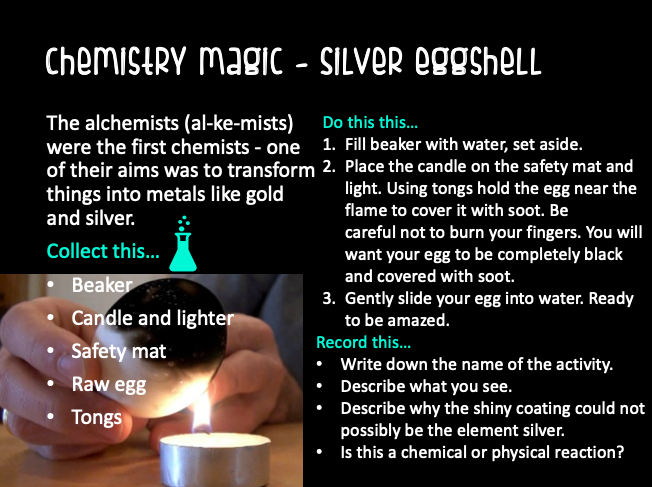
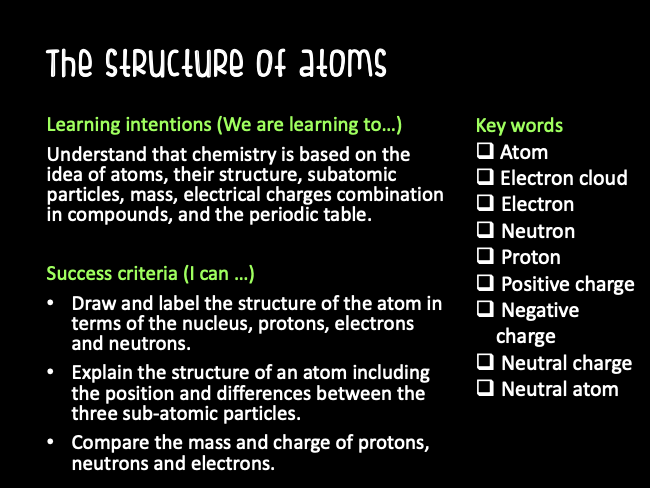
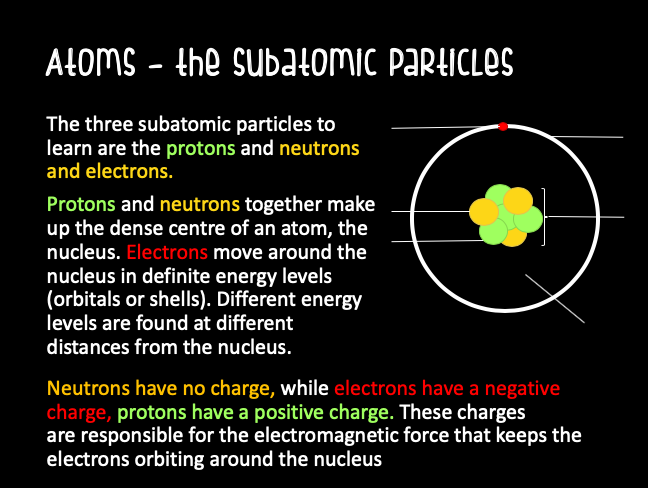
Homework: Great start to the year. Please ensure you keep all your class notes in order, and tidy.
Education Perfect: If your name is not showing below this means your Education Perfect
Any work unfinished needs to be completed for homework. Education Perfect tasks have been set - 20 minutes.
homework tasks sadly were not completed on time. But overall, a great result. You should be proud.
-
Week 4: This week we only had two lessons due to student led conferences on Friday. We continued our exploration of Matter.
Learning intention: Same as previous week. See slide above.
Success criteria: Same as previous week. See slide above.
Key word list: See slide above as we start working through this.
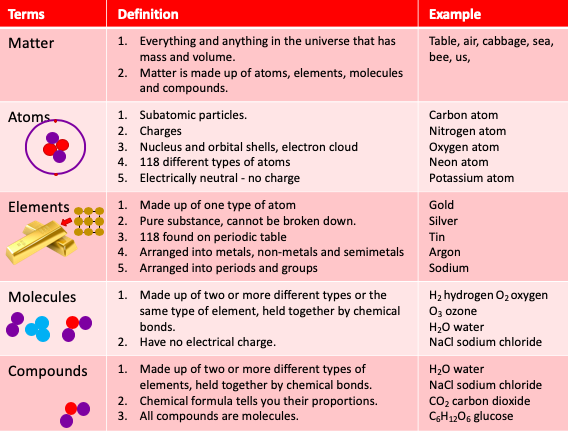
Activities we did in class:
- Started developing an understanding of key terms, for example: Matter, atoms, elements, molecules and compounds
– these terms that can be confusing to learn. - Consulted Google and Youtube to assist us in our learning.
- Reflected on our earlier learning to try and make connections and to identify our learning gaps - completed a class check-in quiz.
- Starting learning about how to write in science - writing to describe, explain and discuss type questions.
Learning to write more than one sentence and to justify and support our answers with knowledge and examples. - Added another word into the list - mixture. How does a mixture differ from a compound?
- Practised counting atoms in compounds.
Homework:
Education Perfect: States of Matter: Level 4. Introduction to Particles (12 minutes) - Started developing an understanding of key terms, for example: Matter, atoms, elements, molecules and compounds
-
Week 5: This week we continue our exploration of Matter - we are now exploring the particle theory of matter.
Learning intention: Same as previous week. See slide above.
Success criteria: Same as previous week. See slide above.
Key word list: See slide above as we start working through this list.
Remember: You need to take excellent notes during class time to help you with your end of year exam revision.
Not all slides are presented here. You need to take ownership of your learning.Activities:
- Explored the Particle theory of matter (relating this to particles in a droplet of water)
- Related the particle theory to the three states of matter and behaviour of atoms
- Researched properties of states of matter at the particle level.
- Reflected and checked in on our learning.
- Discovered the effect heat has on particles in motion learning about kinetic energy
- Youtube: Changes of states of matter

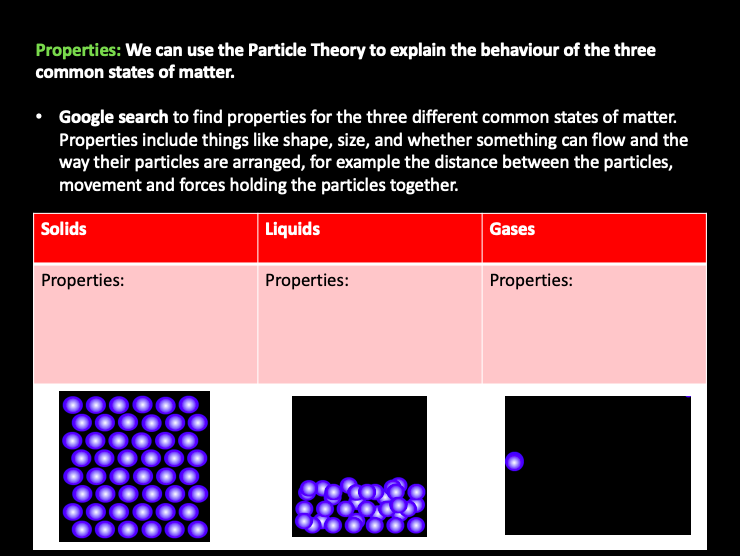
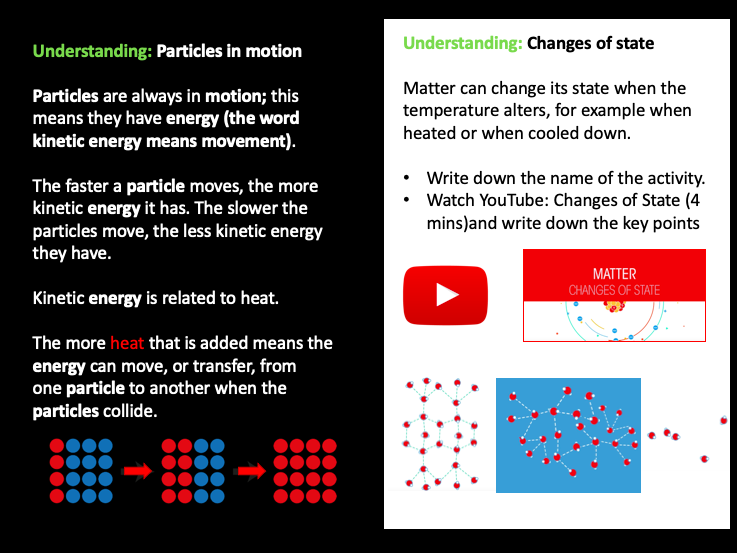

-
Week 6: This week we continue our exploration of Matter - we are now exploring the particle theory of matter.
Learning intention: See above.
Success criteria: See above.
Key word list: See above.
Remember: You need to take excellent notes during class time to help you with your end of year exam revision. Not all slides are presented here. You need to take ownership of your learning.
Activities:
- Finish exploring changing states
- YouTube: States of matter
- Practical investigation: Understanding state changes and graphing
- Understanding boiling, melting and freezing points
- Understand the behaviour matter - diffusion
- Practical investigation: Exploring diffusion
Homework:
- Education Perfect, Particle Model of Matter, due on Sunday 3pm, approximately 30 minutes.
- Unfinished class work


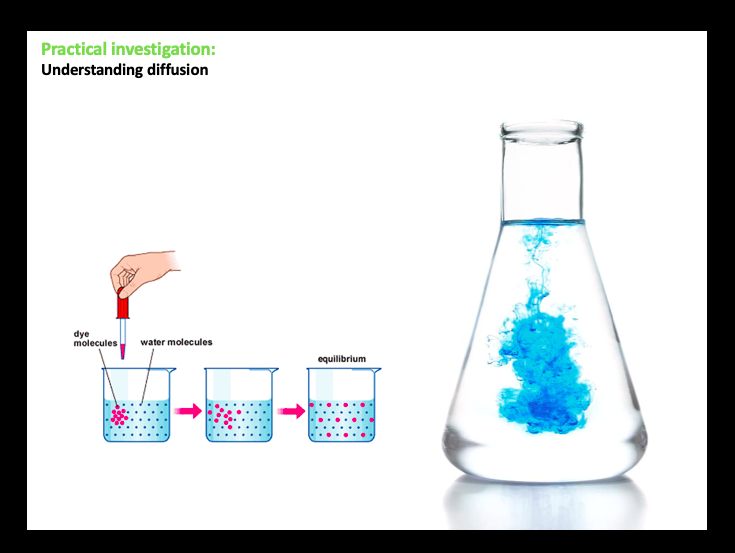
-
Week 7: This week we continue our exploration of Matter - we are exploring the behaviour of atoms - expansion and contraction
Learning intention: See above.
Success criteria: See above.
Key word list: See above.
Remember: You need to take excellent notes during class time to help you with your end of year exam revision. Not all slides are presented here. You need to take ownership of your learning.
Activities:
- Understanding the behaviour of matter - expansion and contraction
- Learning about expansion joints as the particle level
- Exploring heat transfer
- Observing thermal expansion and glass
- Watch Youtube
- SciPAD and class activities and check in points
Homework:- Education Perfect,.
- Unfinished class work as your assessment is fast approaching.
-
Week 8: This week is Assessment week. Due Saturday 10am.
Learning intentions: As above
Success criteria: As above
You assessment notes can be found on MHJC.
Activities:
- Writing your answers to the three separate parts.
- It is critical that you read and understand your assessment document.
- It is critical that you read and understand your Science Writing Document
Homework:
- Completing your assessment.
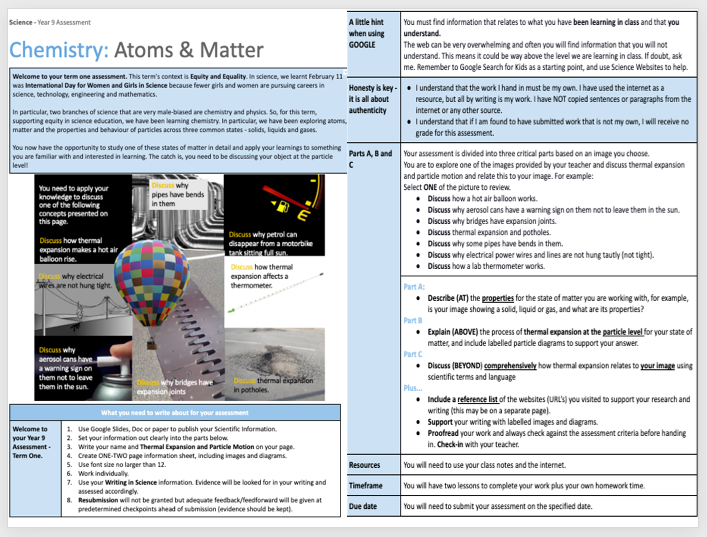


Remember: If we need to work from home at any stage, I will keep posting a summary here what we do each week, but we will work as a class from Google Classrooms - then we can talk and communicate with each other. We are on the home straight in science. You have worked so hard this term - well done!-
Student understanding of atoms, matter and the properties of particles across three common states - solids, liquids and gases.
-
Term 1, Week 1
Welcome back and I hope you had a great break.
We are trying to run a normal class timetable and I will be online for the beginning of each session. Please go to Google Classrooms for your classwork and check your emails for joining Google Hangouts.
Our learning is continuing on from where we left off prior to the holidays. See you online, and don't forget you can email me. I am still marking assessments and will give you feedback later today as to ones I am still missing.
Mrs Williamson
-
Term 2, Week 2
Welcome to this week. Please look out for emails as to when we will catch up.
Your goals this week are to:
- Sign up to Sci PAD if you haven't already done so, as we will be using this more going forward.
- Complete activities on convection, conduction and radiation which are all found on Google classroom.
- Otherwise, good work, remember turning up to class is important and in the end will reduce your workload down!
Take care, see you online.
Mrs Williamson
-
Term 2, Week 3
Welcome to this week. Please look out for emails as to when we will catch up. This week we are going to finish any unfinished tasks
Your goals this week are to:
- Sign up to Sci PAD if you haven't already done so, as we will be using this more going forward.
- Complete any activities that are unfinished - convection, conduction and radiation.
- All resubs need to be in this week unless you have communicated with me and arranged a different hand in date. I shouldn't have to chase you on these.
- Otherwise, good work, remember turning up to class is important and in the end will reduce your workload down.
Take care, see you online.
Mrs Williamson
PS All assessments have now been marked.
-
Term 2, Week 4
This term in Science, we are starting our new context Ecology & Tuakana Teina.
Tuakana-teina is a teaching and learning approach drawn from the Te Ao Māori. It refers to the relationship between an older person (tuakana) and a younger person (teina) or peer to peer.
So.. how are we going to apply this to Science?
- This term, the focus in Science is about taking responsibility for your learning.
- Over the next few weeks, we are going to collaborate and work together (sometimes teacher, sometimes learner). You get the opportunity to participate in our online discussions, share your class document with others, and connect as a team as we talk through Ecology concepts to help each other in our science learning journey.
- Tuakana-teina also involves a mentoring type approach where typically the mentors (tuakana - which is also you) share experiences, and knowledge to help others so we can all grow together.
The following work is by Navroj Kaur


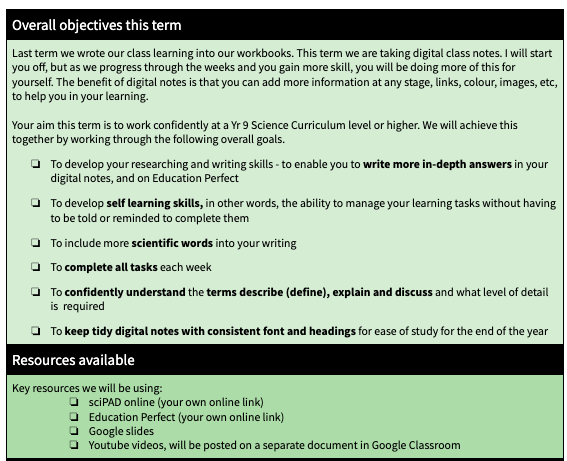

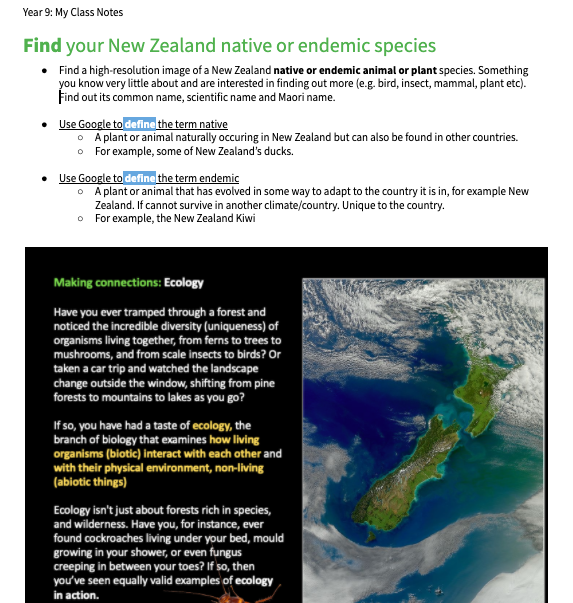
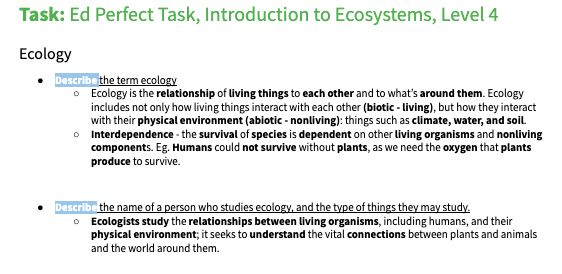
-
Learning intention: As per week 3
Success criteria: As per week 3
Activities: Based on online learning
- Exploring ecology
- Developing an understanding of key ecology terms
- Completing Education Perfect tasks
- Watching Youtube videos
- Applying our knowledge and practising how to write to describe and explain questions
- Sharing our work with our peers
- Collaborating as a class as we work together
- Learning how to take digital notes
The following work is from Mohammed Rizvi
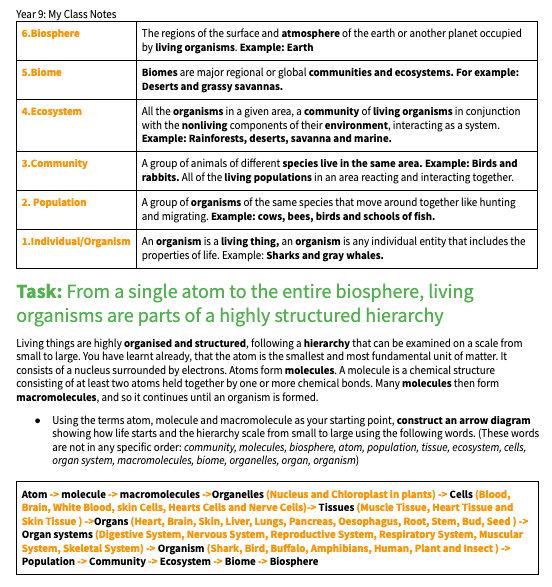
The following work is by Sheryn Hermanto
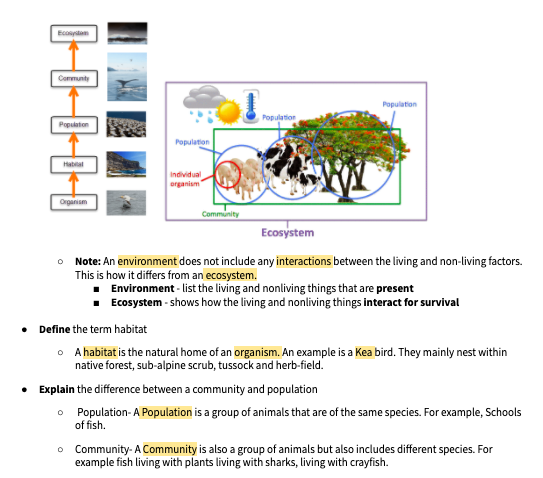
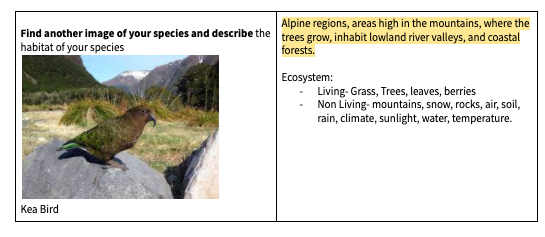
-
Term 2, Week 6
Learning intention: As per week 3
Success criteria: As per week 3
Activities: Based on online learning
- Exploring ecology
- Developing an understanding of key ecology terms
- Completing Education Perfect tasks
- Watching Youtube videos
- Applying our knowledge and practising how to write to describe and explain questions
- Sharing our work with our peers
- Collaborating as a class as we work together
- Learning how to take digital notes
Special note this week:- We are now back at school and as part of our Tuakana Teina context, our new seating plans provides us with the opportunity to help our peers.
This week's class work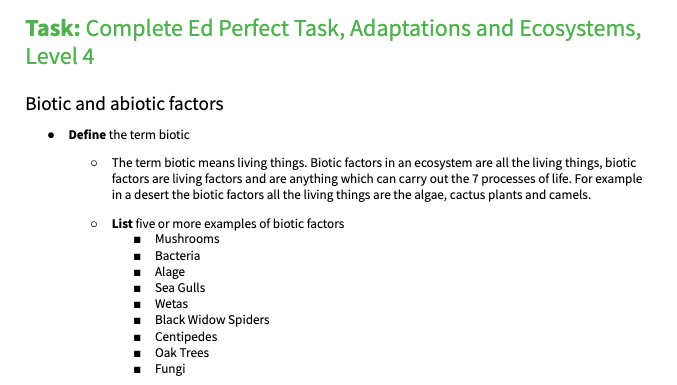
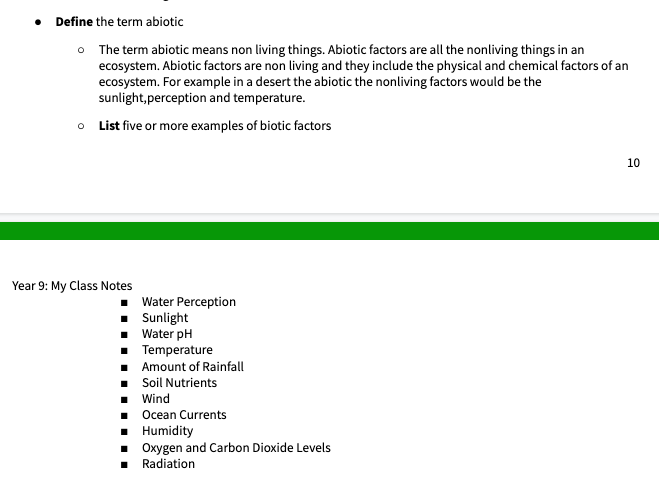

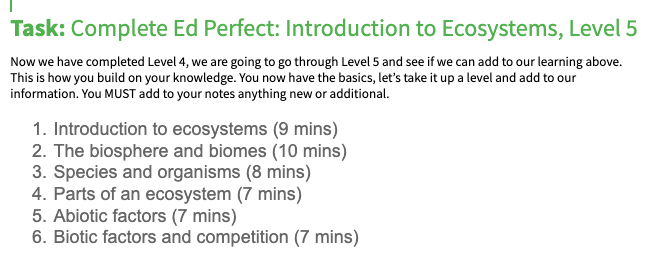
-
Term 2 Week 7
Learning intention: As per week 3
Success criteria: As per week 3
Activities
- Continue to move our learning to level 5
- Work through Education Perfect level 5 - annotate your notes, and complete all exercises
- Complete tasks on symbiosis, adaptations and ectodermic and endothermic
- Reflect on our knowledge to date
Homework
- Complete tasks this week - your own learning
- Prepare for revision test on Tuesday
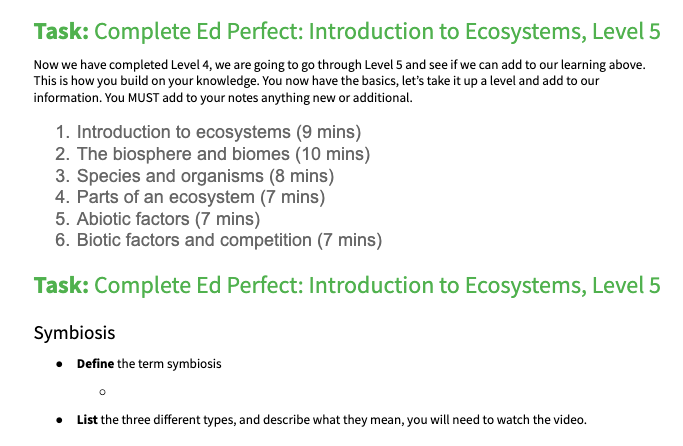
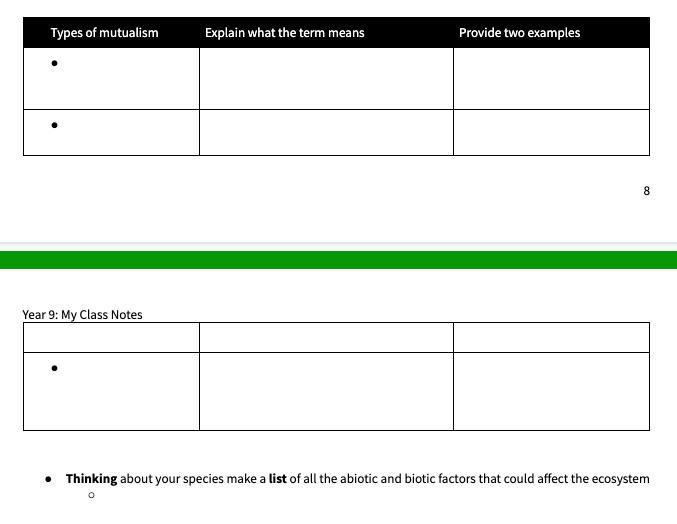
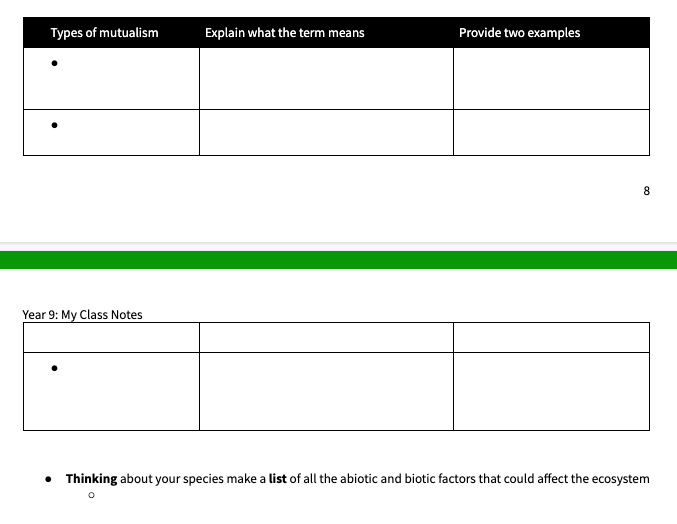
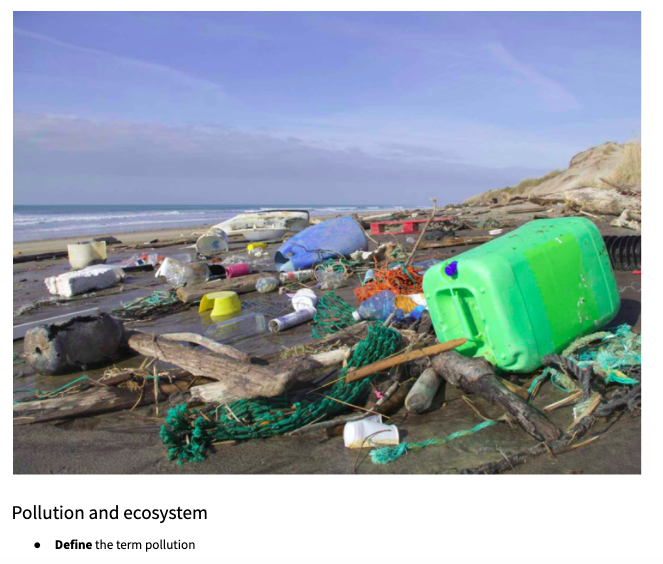


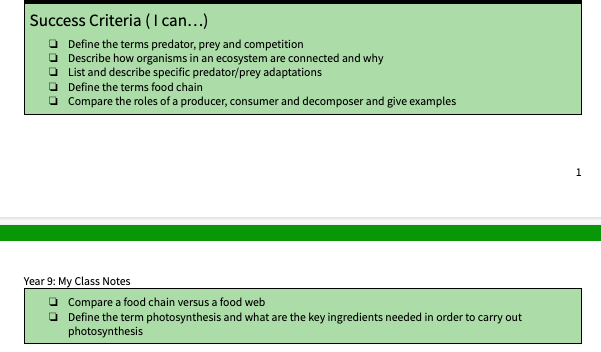
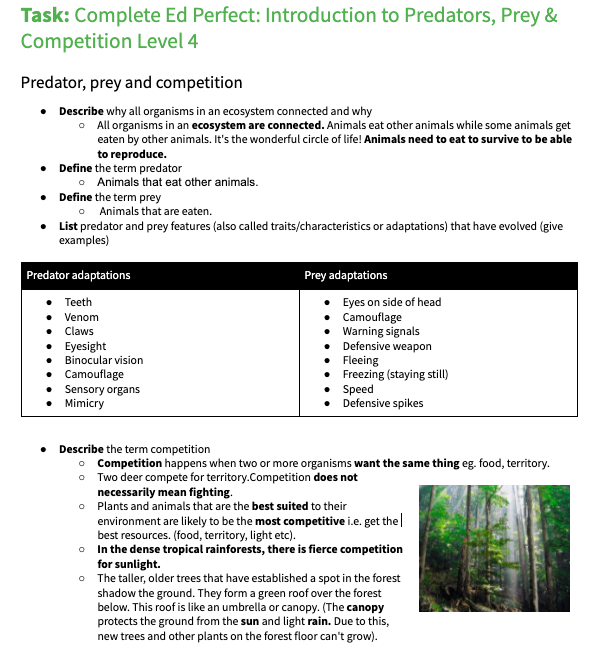
-------------------------------------------------------------------------------------------------- We are EXPLORING...Living World - ecology and evolution level 4 and level 5. As we discover and research our context we are collecting and displaying our knowledge into a digital workbook (this term's focus is also being able to organise our learning digitally)
FOCUS / ARONGA learning intentions:
- We are FOCUSING...on developing our knowledge on ecology and evolution by identifying keywords making links and correlations and learning to write scientifically - defining, explaining, comparing and contrasting.
- We are FOCUSING...on New Zealand ecology - plants and animals.
- We are FOCUSING...on helping each other - collaborating and sharing our learning.
-
Term 2, Week 8
Short week only two lessons
Learning intentions: As per week 3
Success criteria: As per week 3
Activities:
- Reflect: Review our learnings to date and complete Education Perfect Online Practice Assessment - Level 4/5 - 1 hour
- Evaluate our results and gaps in our learning, write up correct answers, review what is required moving forward
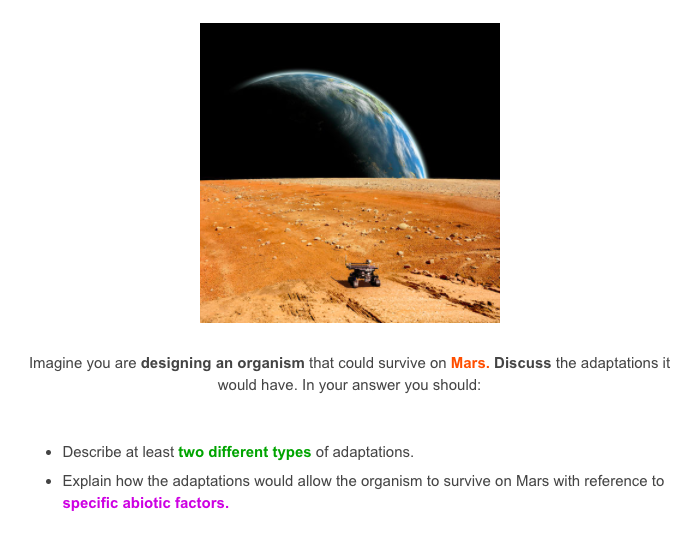
--------------------------------------------------------------------------------------
REFLECT / WHAIWHAKAARO learning intentions:
- We are REFLECTING...to continually assess and evaluate our learning journey on Ecology and Evolution to be able to identify gaps in our knowledge.
-
Term 2, Week 9
Learning intentions: As per week 7 Predators and prey, competitions
Success criteria: As per week 7
Activities:

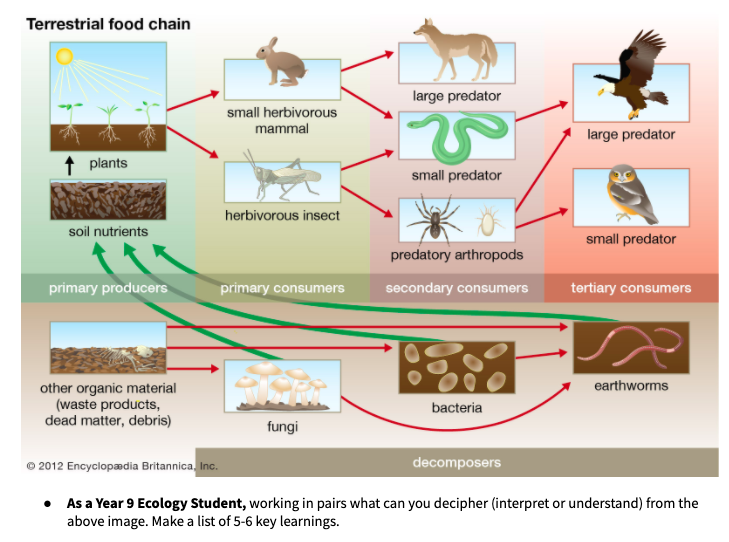

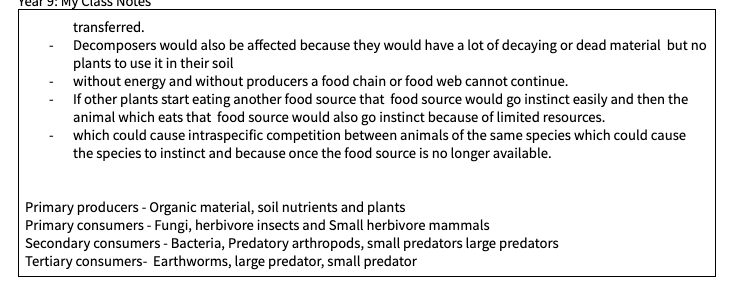

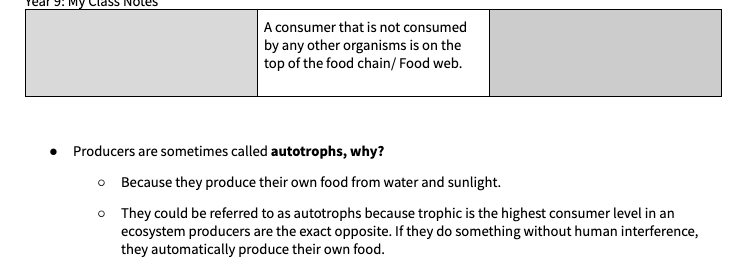
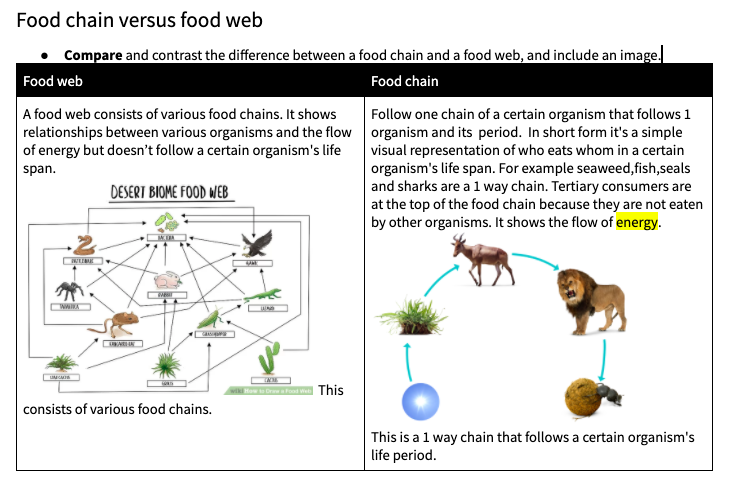
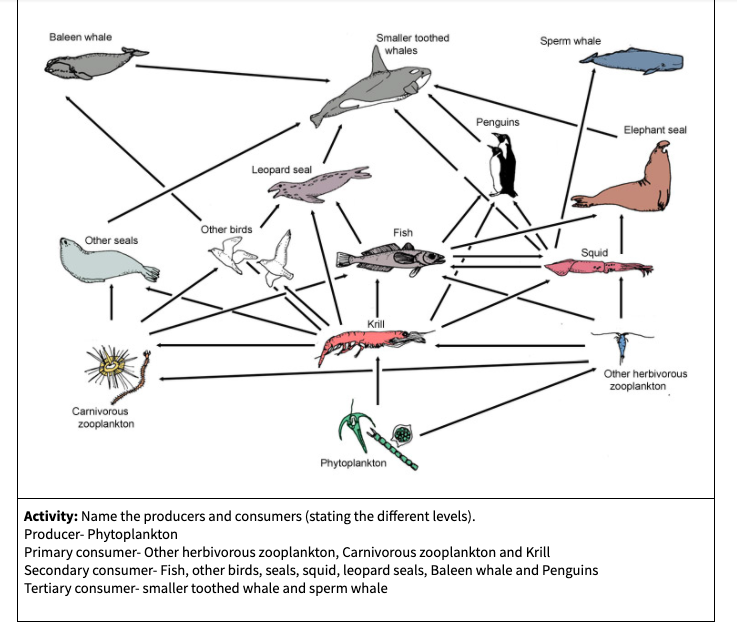

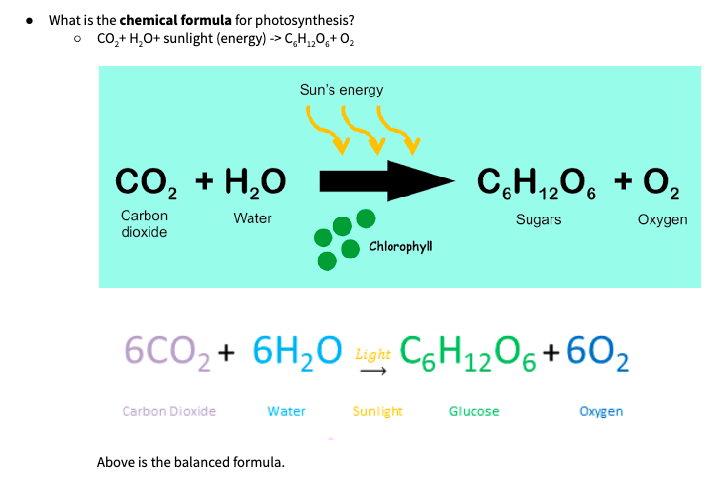
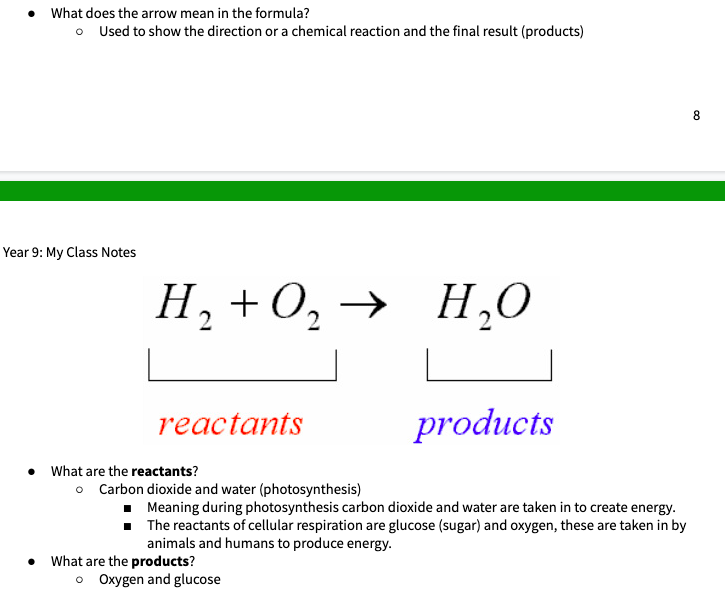
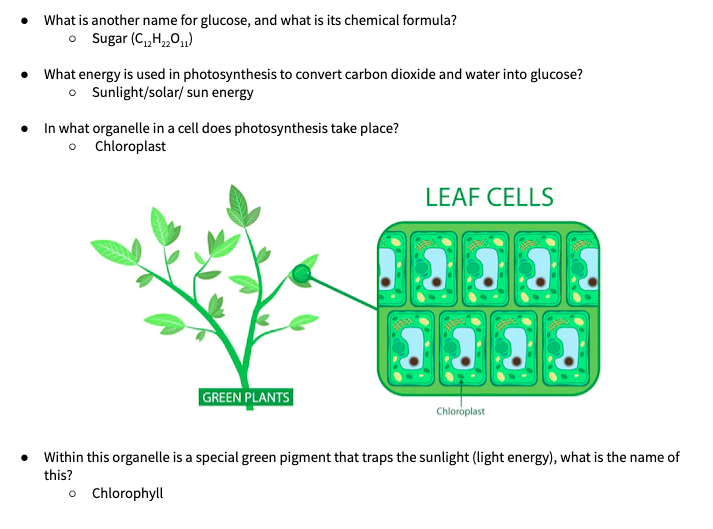

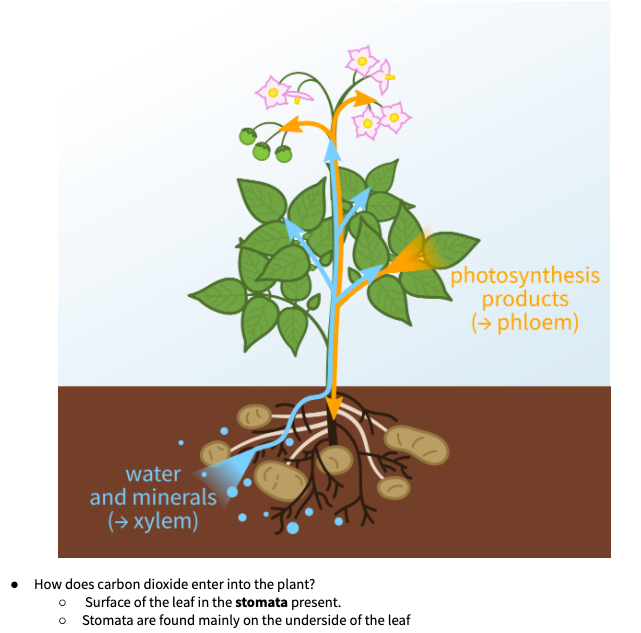
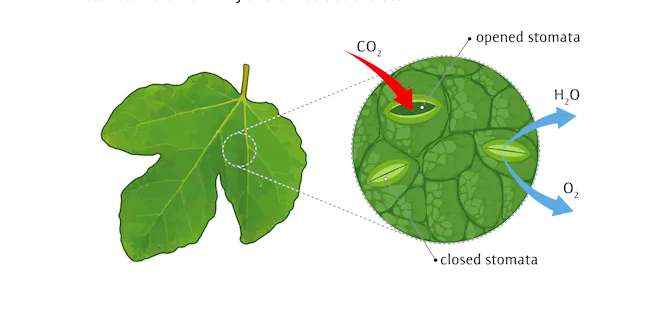

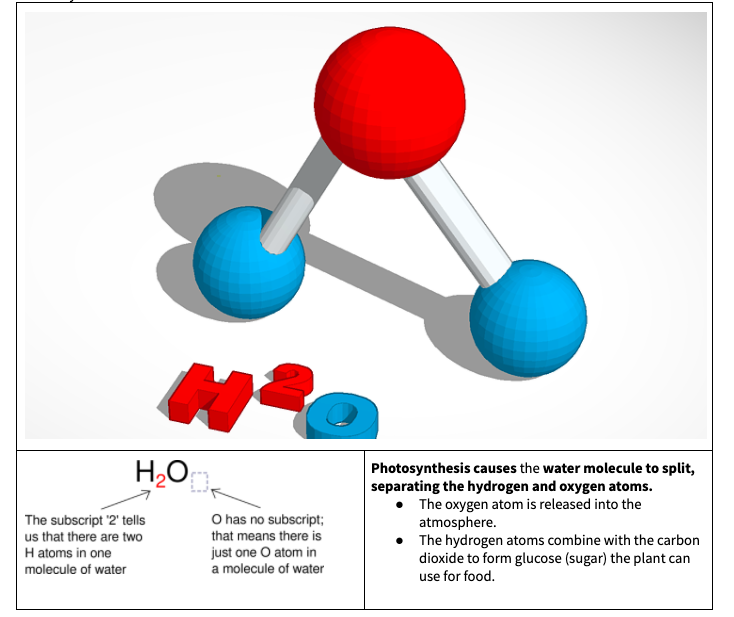
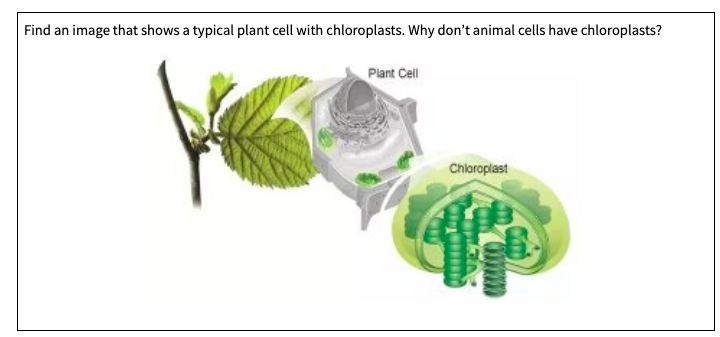

EXPLORE / TŪHURA learning intentions:
- We are EXPLORING...Living World - ecology and evolution level 4 and level 5. As we discover and research our context we are collecting and displaying our knowledge into a digital workbook (this term's focus is also being able to organise our learning digitally)
FOCUS / ARONGA learning intentions:
- We are FOCUSING...on developing our knowledge on ecology and evolution by identifying keywords making links and correlations and learning to write scientifically - defining, explaining, comparing and contrasting.
- We are FOCUSING...on New Zealand ecology - plants and animals.
- We are FOCUSING...on helping each other - collaborating and sharing our learning.
-
Term 2, Week 10
Learning intentions: As per week 7 Predators and prey, competitions
Success criteria: As per week 7
Activities: This week it is about self-management. You need to complete the following and start working on your assessment
- Complete any unfinished tasks on your document
- Complete Level 4 and 5 Education Perfect for online test
- Start your assessment

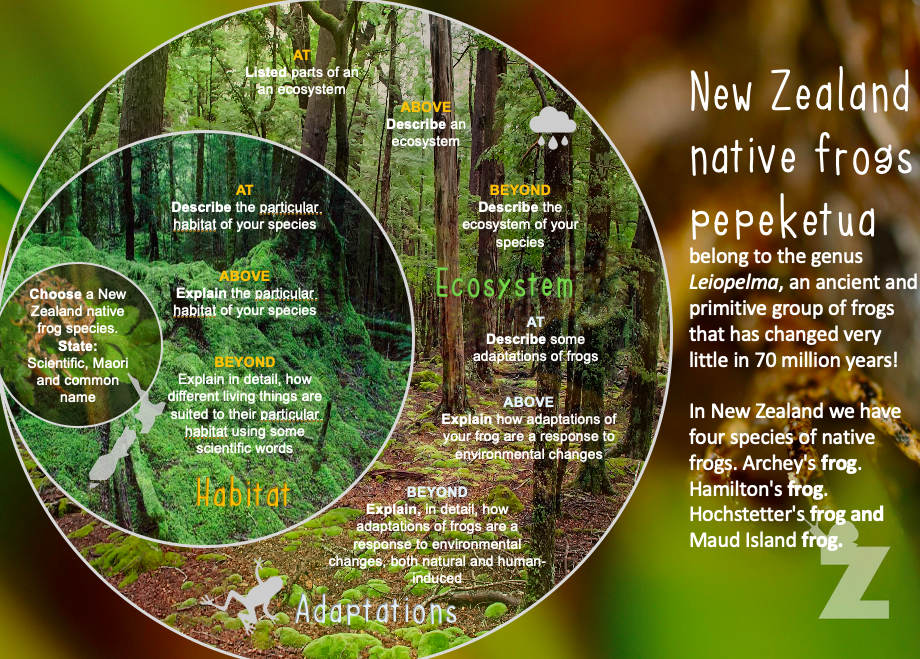

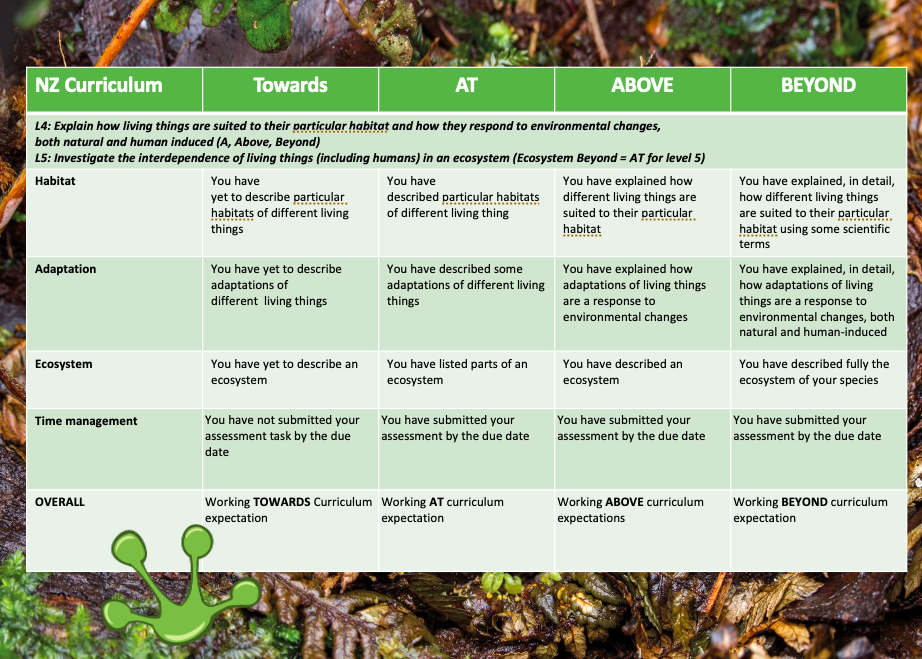
-----------------------------------------------------------------------------------------
PLAN & DO / WHAKAMAHI learning intentions:
- We are PLANNING...to construct a creative web page or magazine page layout for an upcoming event in Forest and Bird to apply and demonstrate our learning. We will be collaborating in small teams.
REFLECT / WHAIWHAKAARO learning intentions:
- We are REFLECTING...to continually assess and evaluate our learning journey on Ecology and Evolution to be able to identify gaps in our knowledge.
- We are REFLECTING...on our ecology learnings as part of our assessment and evaluating any gaps in our learning by complete mock-up tests on Education Perfect.
-
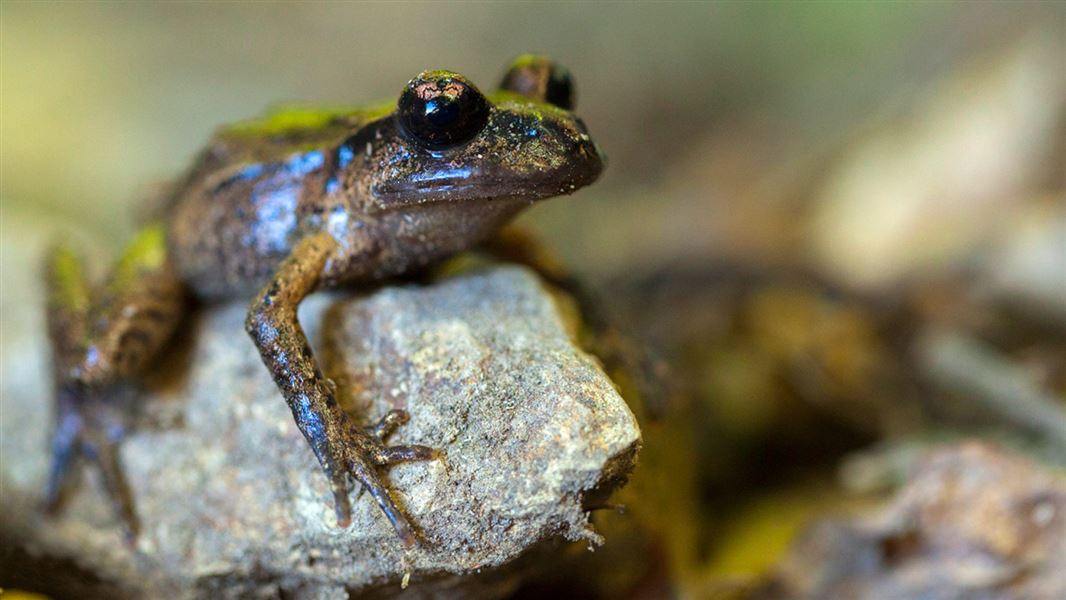
Term 2, Week 11
Learning intentions: As per week 7 Predators and prey, competitions
Success criteria: As per week 7
Activities: Assessment
- Complete any unfinished tasks on your document
- Complete Level 4 and 5 Education Perfect for online test
- Complete your Science Assessment
-----------------------------------------------------------------------------------
REFLECT / WHAIWHAKAARO learning intentions:- We are REFLECTING...on our ecology learnings as part of our assessment and evaluating any gaps in our learning by complete mock-up tests on Education Perfect.
-
Term 2, Week 12 - Final week of the term
Activities:
- Finishing up any incomplete term work
- Finishing off experiments due to lockdown term 1
-
Welcome back to Term 3.
My name is Mrs. Lindsay and I will be continuing your science journey.
My contact details are alindsay@mhjc.school.nzThis term's context is The Power of Choice.
This term, we will explore alternate avenues of health and wellbeing. There are many traditional medicinal practices that have evolved with culture and time. In celebration of Matariki, we will explore the Maori medicines using NZ native plants. We will also draw parallels between animal and plant anatomy and physiology.
I look forward to working with you all.
EXPLORE / TŪHURA learning intentions:
- We are EXPLORING the anatomy and physiology of plants
- We are EXPLORING native NZ plants and their uses in traditional Maori Medicine Rongoā Māori
- We are EXPLORING different understandings and beliefs around health and medicine
-
Kia ora Scientists
Learning Objective- Understand the basic anatomy and physiology of a plant
Success Criteria: I can
justify why plants are living
Identify parts of a microscope
Use a microscope to focus on a specimen
Label parts of a plant and its function
Draw and label a biological drawing correctly
Explain the vascular system of a plant
Identify parts of the vascular system using a microscope
Activities:
- Review MRS GREN to justify plants as living
- Practice our microscope skills
- Draw and label parts of a plant
- Practice our biological drawing skills
- Apply all the skills you've learnt- Learn about vascular systems in a plant and view them through a microscope, and correctly communicate what you see using your biological drawing skills
Further Learning:
See Google Classrooms for set homework and additional resources -
Kia Ora Scientists,
Learning Objective- Understand the basic anatomy and physiology of plants
Success Criteria:
1. Explain the anatomical mechanisms that allow plants to transpire
2. Explain how plants make food (glucose) via photosynthesis in their leaves
3. Conduct an investigation that tests the theory "leaves make starch using sunlight"
4. Describe the reproductive organs of plants and explain how new plants are reproduced
5. Dissect and identify parts of a flower
6. Describe how fertilisation occurs in plants
7. Describe how seeds are dispersed and its advantagesActivities:
- Stomata printing lab
- Describe the role of photosynthesis in plants
- Starch testing geranium leaves
- Make a model of a flower
- Flower dissection
- Seed hunt
- Make a paper helicopter to mimic
Further Learning:All learning resources are posted on Google Classrooms
-
LEVEL 3 COVID LOCKDOWN
Stay home and stay safe.
All learning is posted on Google Classrooms
-
Kia ora and welcome back from lockdown
Success Criteria:
1. Recall the parts of a seed
2. Identify which plants are angiosperm vs gymnosperm
3. Describe the environmental requirements of seed germination
4. Describe the life cycle of a plant, from germination to reproductionActivities:
- Play "Survivor" to revise concepts learnt
- Create a "Cheat sheet" to revise and bring into the assessment.
Include details on how plants grow (germination), make food (photosynthesis), transport systems (vascular systems xylem and phloem, diffusion and osmosis), and reproduction (flowers and seeds). - Conduct a microscope practical assessing your wet mount microscope skills along with your biological drawing skills
- Complete a quiz to show your understanding of the life cycles of plants
Further Learning:
Additional learning resources are posted on Google Classrooms -
Kia ora...
KA PAI to all who revised at home for their Science assessments last week! TINO PAI!!
Now that we have covered the basics of botany, we are going to explore different uses of plants that society has used from generations when ill, with particular focus on Maori Rongoa.
Success Criteria:
1. Define Maori Rongoa. What is it and how is it used?
2. Explore, sketch and identify different NZ native plants that are used for common ailments according to Maori Rongoa
3. Explore and describe other aspects of Maori Rongoa that may contribute to healing the haora.
4. Explore a different traditional medicinal approach. Compare with Maori RongoaActivities:
- Complete a research project on Maori Rongoa
- Compare and contrast Maori Rongoa with another traditional medicinal belief
Further Learning:
All additional learning resources are posted on Google Classrooms -
Kia ora and a big welcome back to Term 4.
I hope you are all feeing refreshed after your 2 week break.
Due to COVID lockdowns, your science exams will be replaced by a one hour Common Assessment Tasks instead (aka CATs) on Tuesday 10th November, Session 4.
In preparation for these CATs, we will be developing our ability to interpret and communicate in science.
Success Criteria:
1. Increasing our understanding of vocabulary used in scientific literature
2. Developing our comprehension skills by describing and summarising what a scientific article is conveying
3. Extrapolating information from a scientific graph or diagram, and accurately communicating what is being conveyed
4. Summarise and describe a graph/diagram/picture using all the words from the title, as well as the text and numerical values in the scale, of the graph/diagram/picture.Activities:
- Reading scientific literature
- Analysing and communicating information conveyed in a scientific article by practising our writing skills with pen and paper (identify/describe/compare/summarise/inference)
Further Learning:
All resources will be handed out in class on paper as opposed to on devices. This is to mimic the CAT conditions. -
Kia ora...
Success Criteria:
1. Communicate a scientific experiment by writing a conventional lab report
2. Draw a graph with all scientific conventions accurately
3. Identify independent, dependent, and controls variables in an experiment
4. I can read various scales accurately
5. I can identify various lab equipment and describe its purpose
6. Use a bunsen burner correctly and safelyActivities:
- SCIPAD- Reading scales accurately
- Lab equipment practical and quiz
- Identifying parts of a bunsen burner and lighting it safely
- Filtration lab- milk and acid
- Distillation lab- separating iron filings, sand, salt
Further Learning:
All resources are posted on Google Classrooms -
Good luck for your CATs this week!
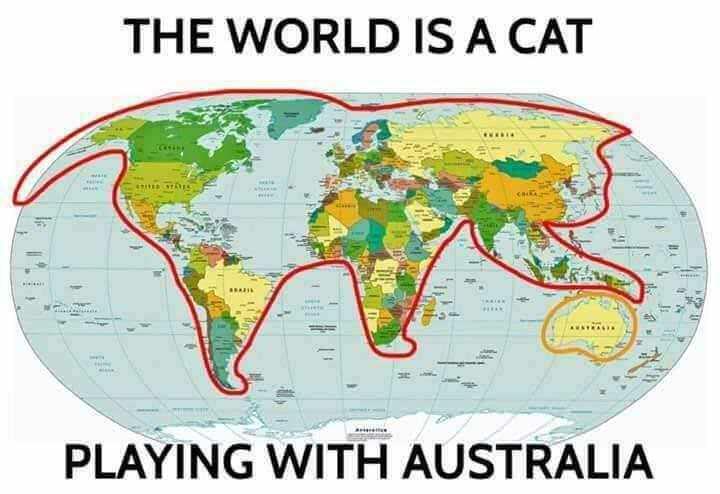
-
Kia ora...
I hope your CATs went well.

Success Criteria:
Activities:
Further Learning:
See Google Classrooms

